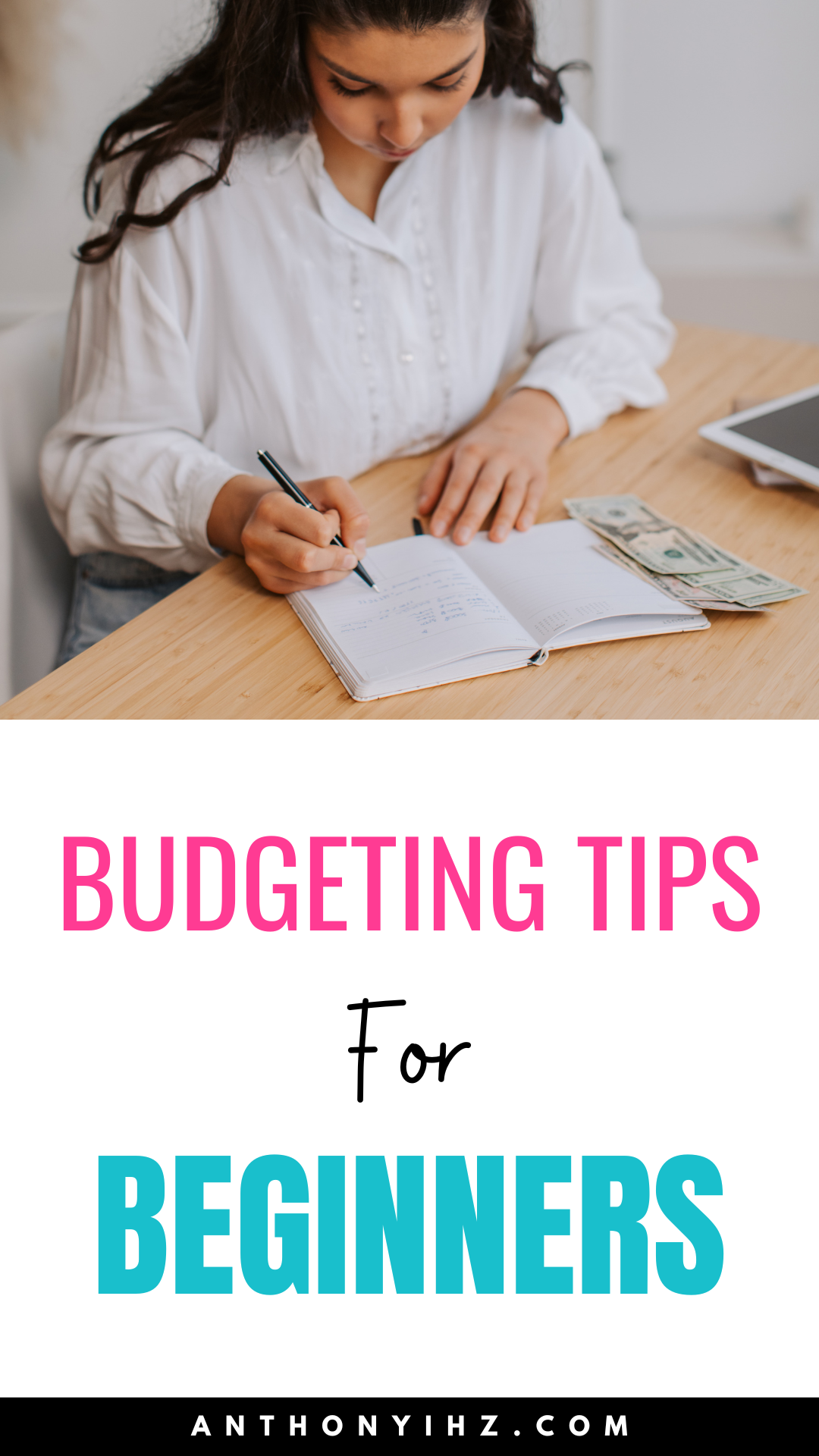
I started budgeting my money as a teenager. Instinctively, I just realized that if I created a plan for how I spent my money, I would manage my financial resources wisely. By the time I grew into a full-fledged adult, budgeting had become a part of me.
Based on my personal experience and some of the standardized techniques for budgeting money, I will be showing you some of the best budgeting tips for beginners.
Hence, this post is perfect for you if you are new to budgeting or if you’ve tried it in the past and couldn’t stick to it. The practical strategies and tips discussed here are feasible and applicable to your financial situation. Best believe you’d find them pretty helpful.
What Is The Purpose Of A Monthly Budget?
One of the primary aims of building a monthly budget is to be able to give an account of how you spend your salary during the course of the month. A budget tells you where your money goes in order to prevent you from spending aimlessly and wasting your money.
How Would Budgeting Improve My Finances?
Budgeting improves your finances by controlling your expenses. Without a budget, you tend to indulge in impulse buying and live above your means. Over time, your bad spending habit could put you in a debt trap. Having a working monthly budget can prevent this from happening.

Budgeting Tips For Beginners: 10 Steps To Easily Start A Budget
Creating a budget becomes simpler when you get used to it. It’s one of the basic things you should do every month for your money. Here are some amazing budgeting tips for beginners you should practice:
1. Budget To Zero
You don’t have to wait until you get your paycheck before you start budgeting. Before the month begins, you should assign every dollar to a particular expense. It’s known as a zero-based budget.
Mind you, I’m not saying this means you should have zero dollars in your bank account after building a budget. Instead, it’s a method that entails creating a plan for every cash you have. This means if you want to set aside $100 for emergencies, that should be included in your budget as well. Bills are not the only things you budget for.
2. Find An Accountability Partner
One of the best tips for creating a budget for beginners is finding an accountability partner. This is much easier if you’re married. You shouldn’t plan for the family’s finances without involving your spouse. Your partner could advise and encourage you through the process.
More importantly, you have someone you are accountable to. This will compel you to stick to the budget. If you aren’t married, you can find a close friend to cheer you on and help you focus on your goals.
3. Begin With The Most Important Categories
Having the right priorities is one of the major tips for first-time budgeting. Building a budget is all about ensuring that you spend your money according to the importance of your needs and wants. Hence, always begin with the most essential categories. They usually include food, utilities, shelter, and transportation. After taking care of your primary needs, you can fill in other categories in the budget.
4. Leave Room For Miscellaneous
One of the budgeting tips for beginners I always recommend is keeping a miscellaneous line in your budget. Having budgeted for your fixed and variable expenses, leave a small amount of money for unplanned expenses. You can call this “miscellaneous”. This way, when a little emergency expense comes up, you can quickly cover it without tampering with the savings you stashed somewhere.
5. Reduce Your Expenses
Discussing how to budget money for beginners reminds me of the need to preach frugal living. If you must stick to your budgeting goal, you need to curb your spending habit as much as you can. The less money you spend, the easier it is for you to pursue your saving goals and reserve extra cash for emergencies.
Canceling unused subscriptions, preparing your own meals, and managing your utilities are some of the ways to cut down costs.
6. Set Goals
This is one of the most overlooked budgeting tips for beginners. When building a habit, it’s easier to stay on track if you have goals in sight. When it comes to budgeting, you need to have goals, too.
Whether you want to pay off student loan faster or you want to build an emergency fund, there should be a “why”. What’s the reason you’re budgeting? If you can’t find a strong reason for building a monthly budget, you may lack the self-motivation to remain consistent.
7. Ditch Credit Cards
Credit cards are the reason why many families can’t live without debt. Even though society makes it look normal, credit cards are certainly not doing your finances any good. As you figure out how to create a monthly budget for beginners, avoid credit.
Stop using credit cards completely. It’s difficult to account for how you spend your money when a credit card balance swallows a significant amount of your take-home pay at the end of every month. This prevents you from having control of your finances, let alone building a budget.
8. Track Your Progress
When trying to achieve something for the first time, you need to find ways to motivate yourself. Tracking your progress is one effective way to stay motivated.
After a few months, have some money discussions with your partner and see how far you’ve come with budgeting. Applaud yourself for doing well and examine the areas you need to improve on. This is how you continue to win with your monthly budget.
9. Use Cash
There are certain categories in your budget that should be handled with cash. It’s the best way to curb your spending. Here’s what I mean. For example, if you are spending too much on groceries and recreation, at the beginning of the month, put some physical cash in an envelope for these categories. The moment you run out of cash, then you have to stop spending. It’s one of the most effective beginner budgeting tips to rely on.
10. Use An Online Budget Tool
Using an online tool to simplify your financial plan is one of the top budgeting tips for beginners. If using pen and paper to budget your money gets boring, don’t hesitate to go digital.
There are many online budgeting tools you can use for free. Apps like EveryDollar and Mint make it quite easy to build a budget and track your progress from your smartphone. Using some of the amazing features in this app, you can create various categories, set reminders, and even sync up the budget with your spouse.
How To Create A Monthly Budget For Beginners
Learning budgeting tips for first-time savers is pointless if you don’t know the step-by-step process involved in building a budget. Here are 5 simple steps on how to budget for beginners:
Step 1: Analyze Your Cash Flow
Analyzing your cash flow and listing your income streams is the first stage, to begin with. Your normal paychecks, side gigs, or garage sales are different categories of income one could have. Once you determine how much gets into your checking account every month, then you know what to work with.
Step 2: List Out Your Expenses
The next step is to list out your expenses. Begin with the fixed expenses: your utilities, house rent, debt, insurance, and other essential bills. You can go ahead and list out other variable expenses like recreation, medical bills, and any other personal spending.
Step 3: Budget To Zero
Using the zero-based budgeting strategy I mentioned earlier, subtract your expenses from your total income. It should equal zero. Even if you have extra cash left after doing this basic math, don’t spend it on impulse purchases. Contribute it toward your savings goals instead. Some budgeting apps like EveryDollar make it a very easy step to do.
Step 4: Monitor Your Transactions
Monitoring your transactions is one of the ways to win when budgeting your salary. You need to always determine how much you’ve spent and if you’re actually on track with the budget. Include every expense and every bit of income into your budget throughout the month. If you have an accountability partner, this is how you prove to them that you’re serious about your goal.
Step 5: Plan Ahead
One simple strategy that has helped me get comfortable with budgeting is building a new budget before the month begins. When you start planning for your money even before your paycheck comes, you are simply getting ready before everything hits you by surprise. As much as this looks trivial, don’t skip it.
How To Stick To A Budget
There are a few tips you can rely on to stick to a budget. Firstly, you must rule out impulse buying from your plan. Before making a big purchase, plan for it. You also need to stop eating out. That’s one of the common ways to live beyond your means. Learn to prepare your own meals since that would save costs.
I know I already talked about ditching credit cards, but that’s another area you must consider too when trying to stick to a budget. Credit cards encourage lavish spending, and that’s a habit you don’t want to have except you want to keep breaking your monthly budget.
Avoid These Common Budgeting Mistakes
Discussing how to create a budget for beginners won’t be complete if I don’t talk about the mistakes to avoid. Learning about these common budgeting mistakes and avoiding them will help you get the most out of your monthly budget.
1. Falling To Write Your Budget Down
One of the budgeting myths that could prevent you from managing your salary wisely is thinking that you can build a budget in your head. Of course, the whole financial plan starts from the mind, but you must write it down.
A written budget teaches you to be more serious and committed to the goal. It is a viable step to ensuring that you don’t overspend each month. Fortunately, you don’t have to literally write down your budget. You can use a budgeting app to create a working budget with a few clicks.
2. Setting Unrealistic Goals
You must think realistically when building a budget. What this means is that the budget should be tailored to your needs. Be honest about the things you can afford and how much you’re willing to save each month. Don’t create a budget that would financially overstretch you. Otherwise, you won’t be able to stick to the budget at the end of the day.
3. Failing To Track One-Time Expenses
You can easily break your budget if you don’t track one-time expenses. Examples of these are birthday parties, anniversary presents, home repairs, vacations, and annual bills.
I recommend you use your calendar to track all the special dates you have these expenses. This way, you are prepared to cover these costs before the due dates. You can start saving toward them months before they are due.
4. Not Planning For Emergency Expenses
Budgeting for beginners can hit a rough patch when one fails to prepare for emergency expenses. It’s true that we can’t always predict when emergencies hit us. That’s why it’s called “emergency” in the first place. However, as much as we can’t predict, we can prepare.
Creating an emergency fund is one reliable way to protect your budget and prevent debt. In case you lose your job, face a medical emergency, or have an unexpected home repair, you will have financial backing.
If you need a comprehensive piece of information about how to prepare for an emergency, check out these 7 steps for building an emergency fund even if you’re a beginner.
5. Giving Up Too Soon
The first time you try building a budget, things may not work out perfectly. You may struggle to track your spending or you could even break the budget at some point. However, cut yourself some slack. Don’t give up just yet.
Instead of getting overwhelmed by all the things that went wrong, pat yourself on the back for the things you did right. The following month, put in your best and watch out for the progress you would make. You know what they say, it gets better with time.
Best Budgeting Apps To Help You Stay On Track
While discussing budgeting tips for beginners earlier, I mentioned using an online tool. If budgeting ever feels like hard work, then you definitely need to use a tool that makes the whole process easier. Here are some of the best budgeting apps out there for you:
1. You Need A Budget (YNAB)
As of 2024, You Need A Budget (YNAB) is one of the most trusted tools for budgeting. The owners of the app claim that new users tend to save around $600 within the first two months of using the app and $6000 after a year. The app costs $99 per year. However, there is a 34-day free trial for all new users. You can decide if you want to subscribe to the premium plan after that.
2. Mint
With over 25 million users, Mint stands out as one of the most popular budgeting apps you can find. Whether you are a beginner or someone who has been budgeting for a long time, this app is perfect for you. You can sync it with your bank account, set up payment reminders for bill payments, and access your TransUnion credit score. The best part about using Mint is that it is free.
3. Simplifi
Simplifi is a unique budgeting app as it offers personalized spending plans and also provides real-time updates of how much money remains for the month. Like most budgeting apps, you can sync your bank account with Simplifi and track the progress of your financial goals. You can also use this app to track your monthly bills and subscriptions. Unlike Mint, Simplifi is not a free app. It costs $47.99 per year.
4. Zeta
If you want to build a budget with your spouse, this is the perfect app for you. It’s one of the few free budgeting apps that allow couples to budget their income together and also monitor their progress from their mobile phones respectively. Zeta also offers you the option to sign up for a joint no-fee banking account. You will have access to the Allpoint ATM network, digital checks, contactless payments, and more.
5. Pocket Guard
Just as the name implies, Pocket Guard is a special budgeting app designed to help you curb overspending. The app is run with an algorithm that tracks your income, expenses, and savings goals to suggest how much you are supposed to spend every day. With the suggested spending limits, you will find yourself saving extra money from being frugal.
Final Words On Budgeting Tips For Beginners
This post has shed light on all the major areas of building a realistic budget that a beginner should know.
You’ve learned several budgeting tips for beginners that would help you stay on track. You’ve also discovered some of the common mistakes that affect the efficiency of a budget. Lastly, I’ve shown you some amazing budgeting apps that would help you do all the heavy lifting. You obviously don’t have any excuse to spend another month without a budget.
Pin this for later!


